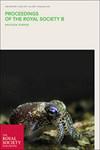Lifetime trajectories of male mating effort under reproductive conflict in a cooperatively breeding mammal.
IF 3.8
1区 生物学
Q1 BIOLOGY
Proceedings of the Royal Society B: Biological Sciences
Pub Date : 2024-09-18
DOI:10.1098/rspb.2024.1499
引用次数: 0
Abstract
The costs of reproductive conflict can shape the evolution of life-histories in animal societies. These costs may change as individuals age and grow, and with within-group competition. Social costs of reproductive conflict have been invoked to explain why females might gain from delaying maturity or ceasing reproduction midway through life, but not in males. Here, we analyse more than 20 years of data to understand how individual male banded mongooses adjust their reproductive activity in response to the costs of reproductive conflict. In banded mongoose groups, multiple female breeders enter oestrus synchronously that are each guarded by a single male that aggressively wards-off rivals. The heaviest males in the group gained the greatest share of paternity. Those lighter males that are reproductively active paid disproportionate survival costs, and by engaging in reproductive activity early had lower lifetime reproductive success. Our results suggest that reproductive inactivity early in life is adaptive, as males recoup any lost fitness by first growing before engaging in less costly and more profitable reproductive activity later in life. These results suggest that resource holding potential of males and the intensity of reproductive conflict interact to shape lifetime schedules of reproductive behaviour.一种合作繁殖的哺乳动物在生殖冲突下雄性交配努力的终生轨迹。
生殖冲突的代价会影响动物社会中生命史的演变。这些成本可能会随着个体的年龄和成长以及群体内部的竞争而改变。生殖冲突的社会成本被用来解释为什么雌性会从推迟成熟或中途停止生殖中获益,而雄性却不会。在这里,我们分析了 20 多年的数据,以了解雄性带吻獴个体如何根据生殖冲突的成本调整其生殖活动。在带子獴群体中,多只雌性繁殖者同步进入发情期,每只雌性繁殖者都由一只雄性繁殖者守护,雄性繁殖者会积极抵御对手。群体中体重最大的雄性获得最大份额的父子关系。那些体重较轻、生殖活跃的雄性付出了过高的生存成本,而且由于过早参与生殖活动,其一生的生殖成功率较低。我们的研究结果表明,雄性在生命早期不从事生殖活动是一种适应性行为,因为雄性在生命后期从事成本较低、收益较高的生殖活动之前,会先通过生长来弥补体能损失。这些结果表明,雄性的资源占有潜力和生殖冲突的强度相互作用,形成了终生的生殖行为时间表。
本文章由计算机程序翻译,如有差异,请以英文原文为准。
求助全文
约1分钟内获得全文
求助全文
来源期刊
CiteScore
7.90
自引率
4.30%
发文量
502
审稿时长
1 months
期刊介绍:
Proceedings B is the Royal Society’s flagship biological research journal, accepting original articles and reviews of outstanding scientific importance and broad general interest. The main criteria for acceptance are that a study is novel, and has general significance to biologists. Articles published cover a wide range of areas within the biological sciences, many have relevance to organisms and the environments in which they live. The scope includes, but is not limited to, ecology, evolution, behavior, health and disease epidemiology, neuroscience and cognition, behavioral genetics, development, biomechanics, paleontology, comparative biology, molecular ecology and evolution, and global change biology.

 求助内容:
求助内容: 应助结果提醒方式:
应助结果提醒方式:


